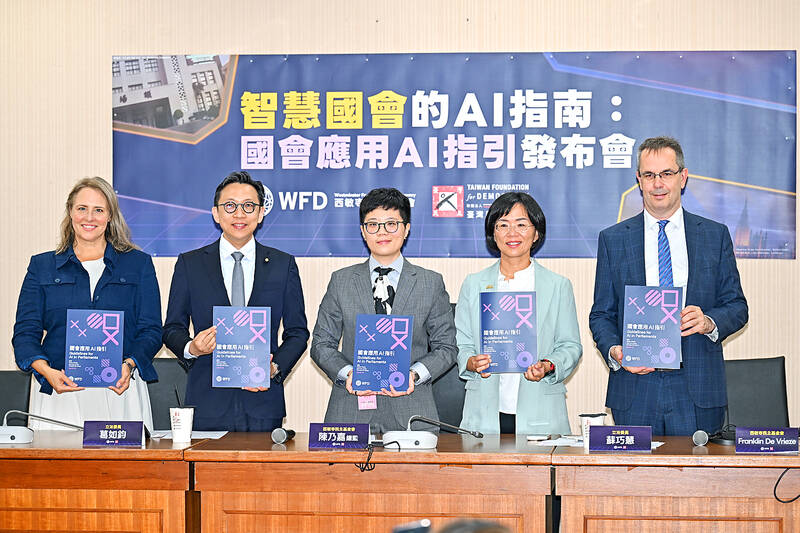The Legislative Yuan should adopt applied artificial intelligence (AI) guidelines to facilitate communication with the public and protect government information security, lawmakers and groups said yesterday.
The Taiwan Foundation for Democracy (TFD) and the London-based Westminster Foundation for Democracy (WFD) made the comments at a news conference at the legislature in Taipei, advocating for the use of the Artificial Intelligence Guidelines for Parliaments the UK-based foundation published last year.
The Legislative Yuan must adopt AI, a technology that almost everyone uses, TFD president Liao Da-chi (廖達琪) said in a prerecorded video.

Photo: Chen Chih-chu, Taipei Times
The guidelines aim to help legislatures worldwide navigate the technological pitfalls of AI, including risks to privacy and government secrets, Liao said.
The two foundations in March signed a “smart parliament” cooperative agreement in the presence of Legislative Speaker Han Kuo-yu (韓國瑜), said Chen Nah-chia (陳乃嘉), the director of the WFD’s Taiwan office.
The TDF and WFD collaboration would focus on overcoming the complex international and multidisciplinary challenges arising from the intersection of democracy and AI, she said.
Taiwanese must ensure that technology is a facilitator of democracy and not a threat to it, Chen added.
Applied AI could improve the quality of the legislature’s work by eliminating errors in the writing of laws and attributing responsibility when mistakes occur, Democratic Progressive Party Legislator Su Chiao-hui (蘇巧慧) said.
The guidelines provide many case studies that could assist the Legislative Yuan make use of AI in the appropriate fields, she said.
The guidelines could help the legislature the same way as the proposed basic law governing AI, Chinese Nationalist Party (KMT) Legislator Ko Ju-chun (葛如鈞) said.
Lawmakers should consider AI’s potential for improving the legislature’s efficiency, transparency, and ability to inform the public clearly and quickly, Ko said.
Parliaments that fail to develop necessary AI policies would contribute to widening the gap between the emerging technology and governments’ ability to regulate them, guideline coauthor Franklin de Vrieze said.
The European Parliament and the legislatures of Canada, Brazil, the Netherlands and Estonia are some of the legislative bodies that have rolled out applied AI, which has proven effective in writing laws, recording meetings, boosting public participation and determining meeting agendas, he said.
Lawmakers should use AI as a “diligent intern” to research their options, not as a provider of solutions, guideline coauthor Marci Harris, executive director of the PopVox Foundation, said.

Japanese footwear brand Onitsuka Tiger today issued a public apology and said it has suspended an employee amid allegations that the staff member discriminated against a Vietnamese customer at its Taipei 101 store. Posting on the social media platform Threads yesterday, a user said that an employee at the store said that “those shoes are very expensive” when her friend, who is a migrant worker from Vietnam, asked for assistance. The employee then ignored her until she asked again, to which she replied: "We don't have a size 37." The post had amassed nearly 26,000 likes and 916 comments as of this

US President Donald Trump said "it’s up to" Chinese President Xi Jinping (習近平) what China does on Taiwan, but that he would be "very unhappy" with a change in the "status quo," the New York Times said in an interview published yesterday. Xi "considers it to be a part of China, and that’s up to him what he’s going to be doing," Trump told the newspaper on Wednesday. "But I’ve expressed to him that I would be very unhappy if he did that, and I don’t think he’ll do that," he added. "I hope he doesn’t do that." Trump made the comments in

Tourism in Kenting fell to a historic low for the second consecutive year last year, impacting hotels and other local businesses that rely on a steady stream of domestic tourists, the latest data showed. A total of 2.139 million tourists visited Kenting last year, down slightly from 2.14 million in 2024, the data showed. The number of tourists who visited the national park on the Hengchun Peninsula peaked in 2015 at 8.37 million people. That number has been below 2.2 million for two years, although there was a spike in October last year due to multiple long weekends. The occupancy rate for hotels

A cold surge advisory was today issued for 18 cities and counties across Taiwan, with temperatures of below 10°C forecast during the day and into tonight, the Central Weather Administration (CWA) said. New Taipei City, Taipei, Taoyuan and Hsinchu, Miaoli and Yilan counties are expected to experience sustained temperatures of 10°C or lower, the CWA said. Temperatures are likely to temporarily drop below 10°C in most other areas, except Taitung, Pingtung, Penghu and Lienchiang (Matsu) counties, CWA data showed. The cold weather is being caused by a strong continental cold air mass, combined with radiative cooling, a process in which heat escapes from